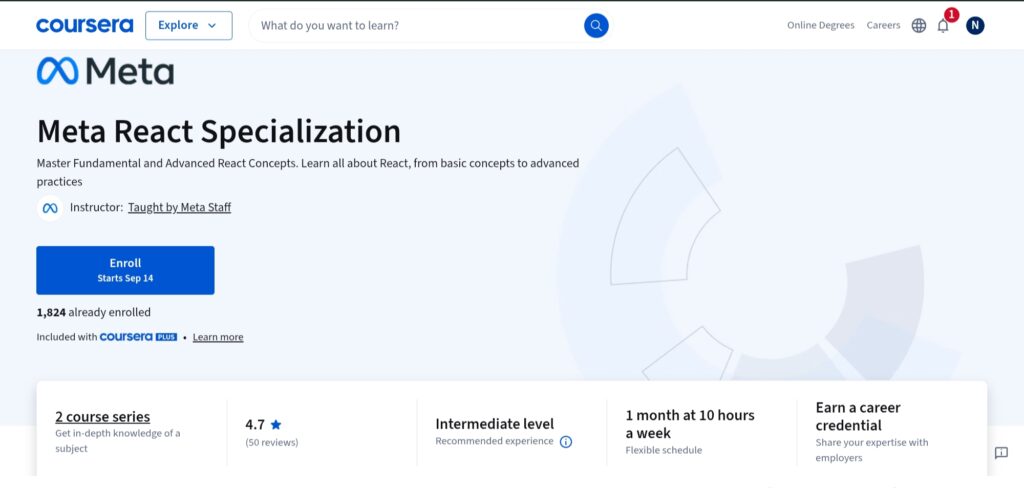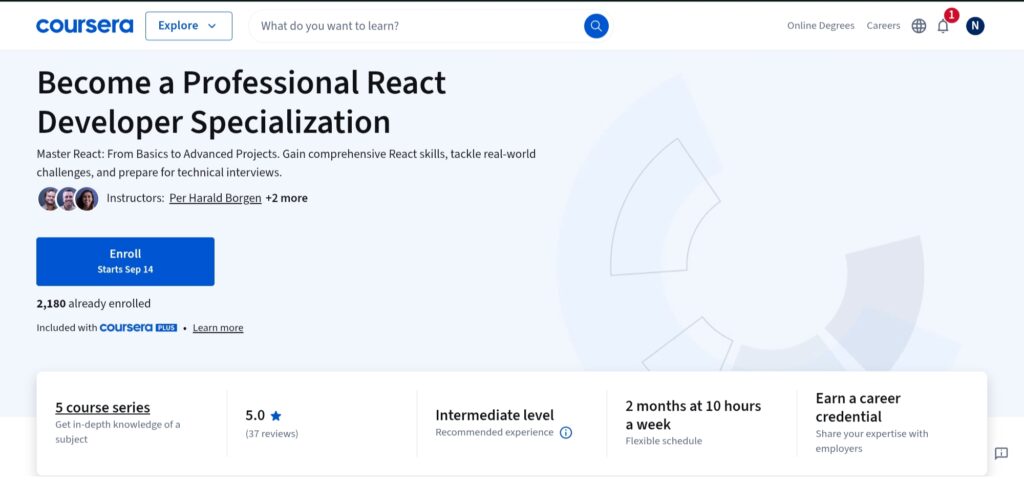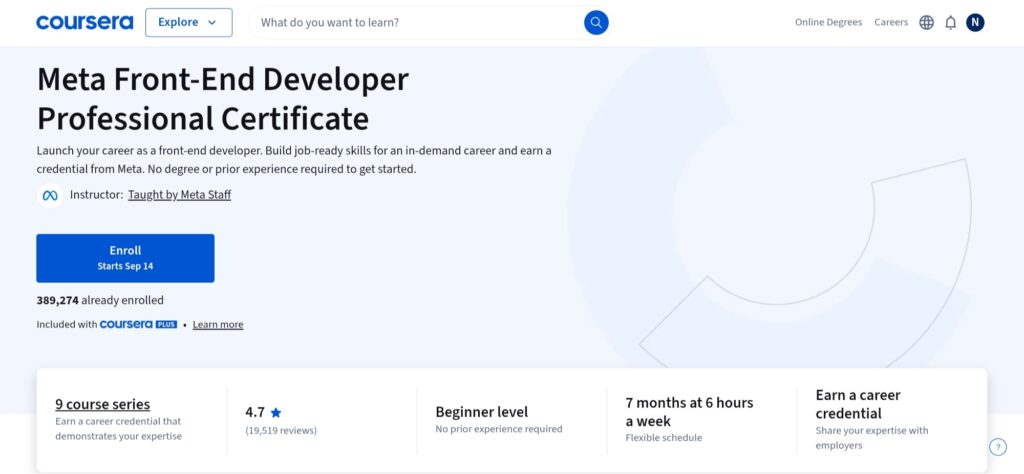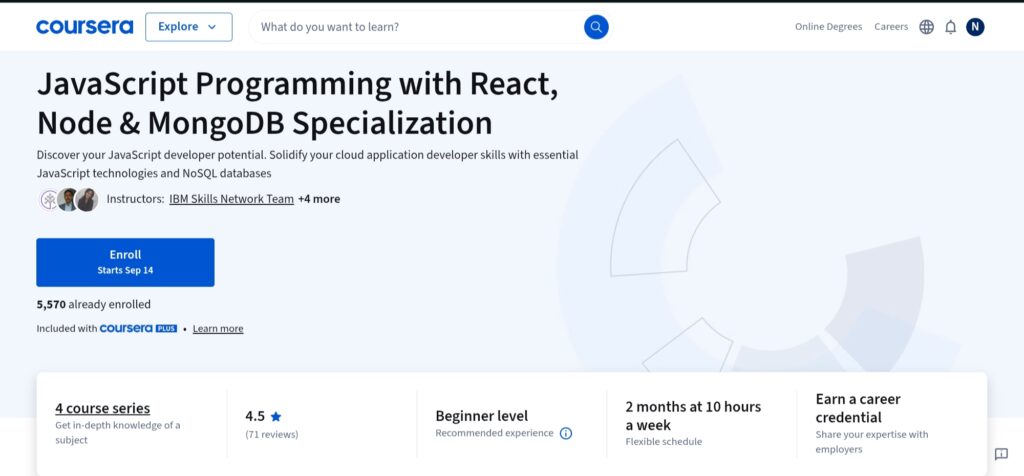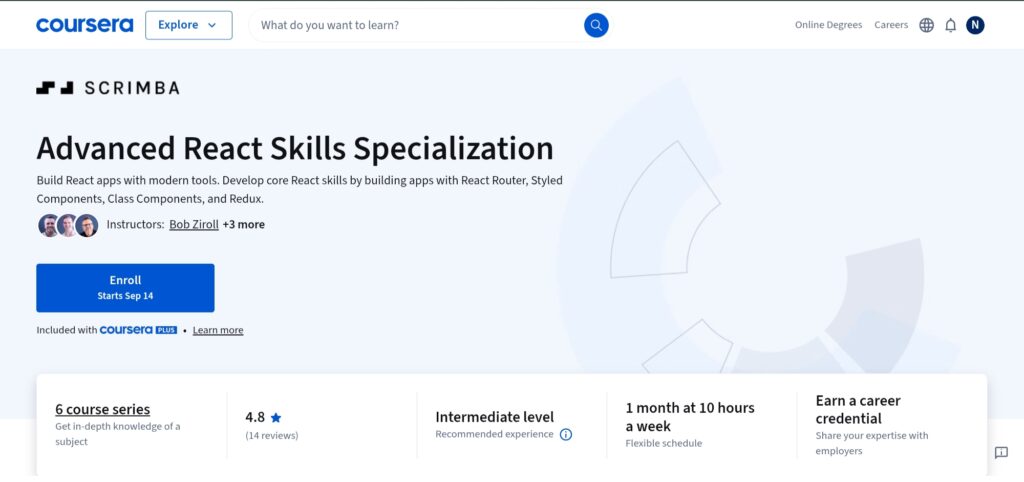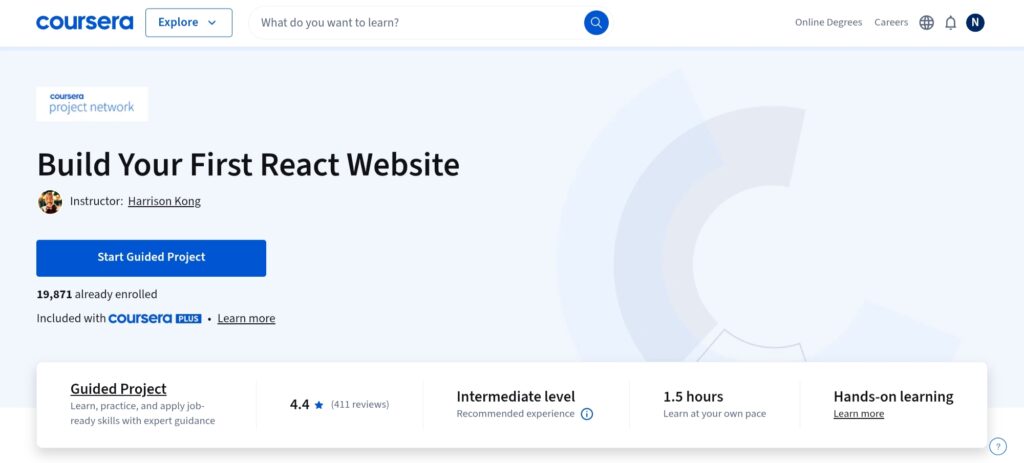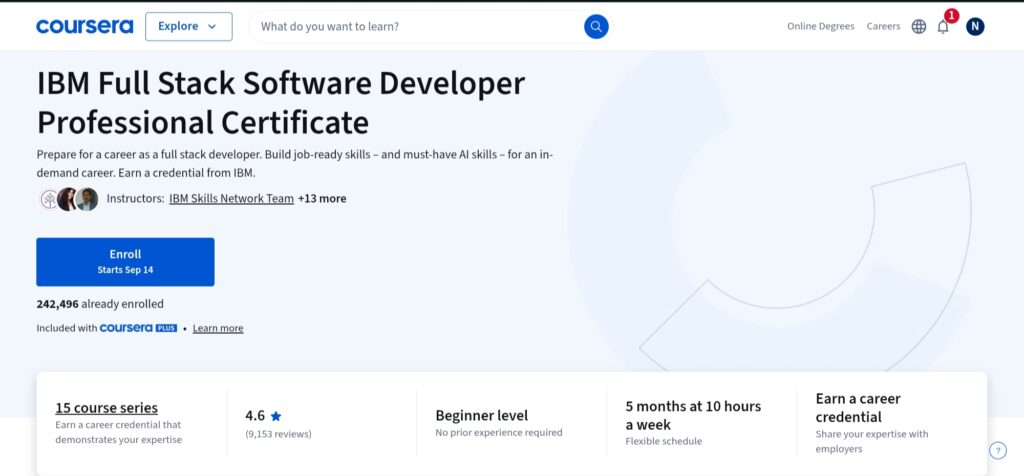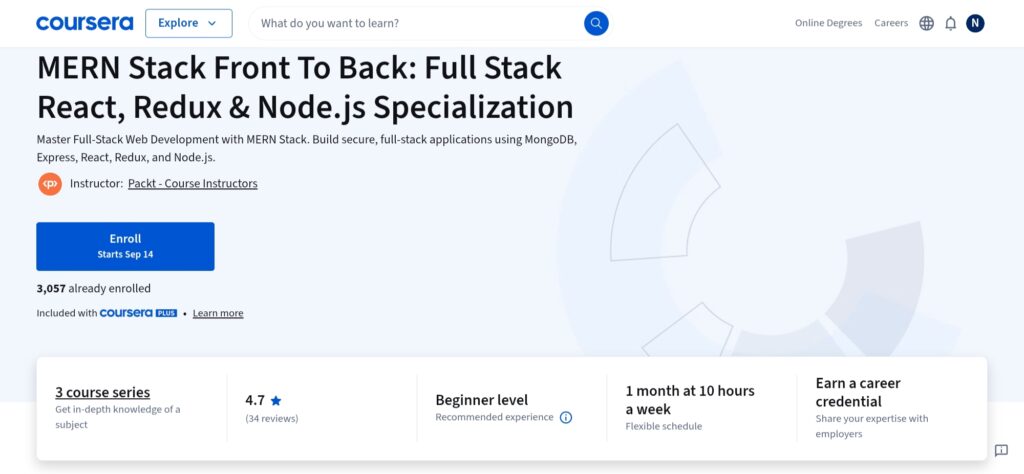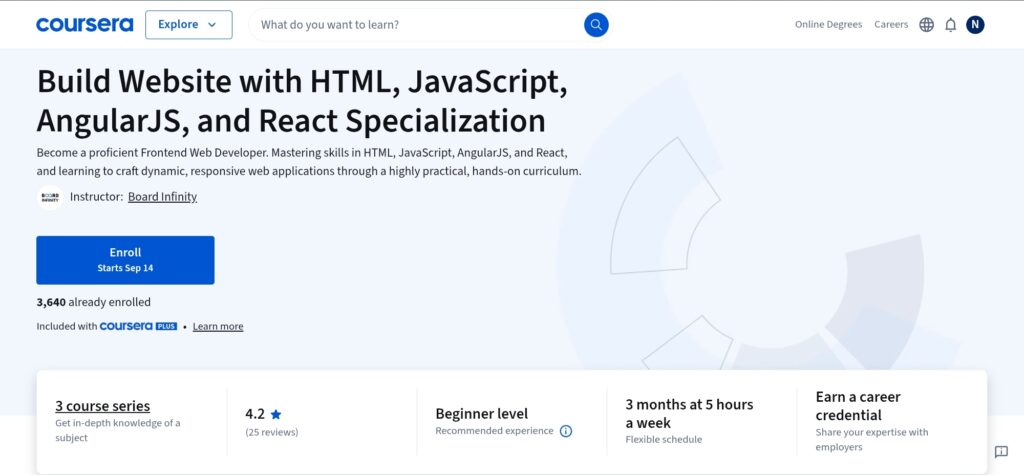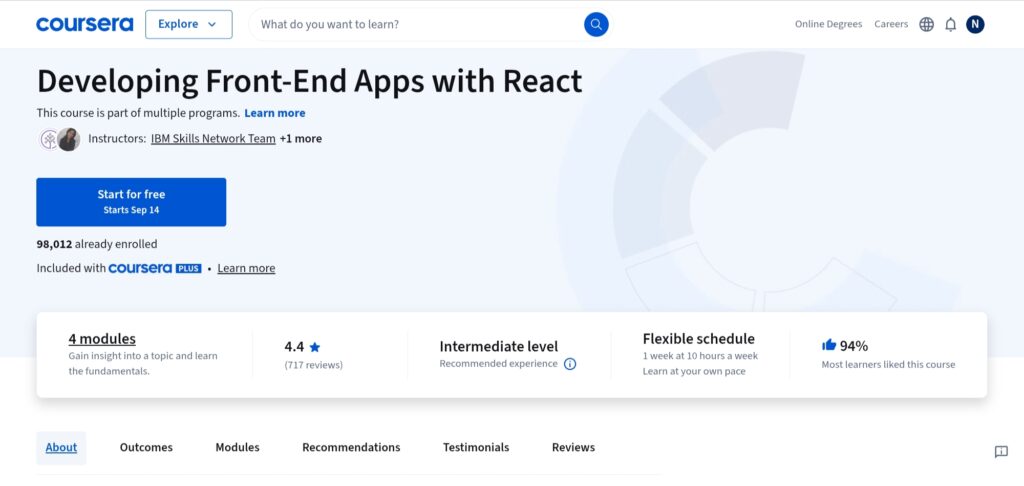Last updated on January 8th, 2026 at 10:18 am
From modest websites to large-scale web apps, React has emerged as one of the most popular front-end development libraries.
Developers and businesses throughout the world use it because of its component-based architecture, user-friendliness, and robust community support.
As companies seek experts who can create quick, scalable, and engaging user experiences, the need for React developers will only increase in the future.
A reliable educational resource for anyone wishing to start or progress in web development is Coursera.
Leading institutions, tech firms like IBM and Meta, and industry professionals collaborated to build the courses, which give students real-world experience and professional credentials.
You will graduate with a portfolio of work that you can show potential employers, because the majority of these programs involve practical projects.
I have listed the best React courses on Coursera in this post. You’ll discover current recommendations whether you’re a novice beginning from scratch, an intermediate learner honing your craft, or an experienced developer hoping to grasp full-stack principles.
Every course places an emphasis on practical applications, assisting you in moving beyond theory and creating projects that get you ready for career opportunities.
Why Learn React in 2025?
One of the most important talents for web developers in 2025 is the ability to use React, which still dominates the front-end ecosystem.
React is the most used JavaScript framework and library, according to industry surveys, and it powers websites and apps for businesses like Shopify, Netflix, Airbnb, and Meta.
React knowledge is still in great demand, as the need for qualified front-end engineers is increasing by more than 20% annually.
React-savvy developers also benefit from competitive pay, with numerous positions in the US and Europe paying between $80,000 and $120,000 a year, while remote work options are growing all over the world.
From a technological standpoint, React is essential to contemporary full-stack and web development.
It is crucial for developing quick, scalable, and user-friendly apps because of its reusable components, effective rendering using the virtual document object model, and compatibility with frameworks like Next.js.
Additionally, React seamlessly interfaces with databases like MongoDB and backend technologies like Node.js and Express, enabling developers to move into full-stack positions.
Because of its adaptability, understanding React enhances your front-end skills and provides access to more extensive job options.
React has definite benefits for those who are new to coding, professional developers seeking to improve their abilities, or career changers joining the IT industry.
Inexperienced users value its abundance of educational tools and encouraging community. To stay up to date with industry norms and transition into full-stack development, seasoned developers utilize React.
While React is one of the quickest ways to obtain employable web development skills today, career changers benefit from its high demand in the labor market.
How We Picked the Best React Courses
The top React programs had to be carefully chosen from among hundreds of online courses. We looked over Coursera learner reviews and course ratings to make sure every suggestion had merit.
Popularity and trust were also strongly indicated by the number of students enrolled.
More importantly, all of the courses on this list have been updated for React 18/19, so you’ll be studying the newest features and techniques associated with contemporary development.
I also made sure that all skill levels were covered in the courses. Step-by-step introductions are provided to beginners, providing a strong foundation without being overly technical.
Intermediate students can explore more complex ideas like hooks, state management, and React Router, while more experienced developers can take advantage of full-stack projects that combine React with cloud, Node.js, and MongoDB.
Every stage of your learning path will have something to offer thanks to this combination.
Last but not least, we examined each program’s career worth. Hands-on projects that allow you to create practical applications are a common feature of these Coursera courses and specializations.
These assignments not only help you build a portfolio that potential employers may view, but they also reinforce what you have learned.
Additionally, your resume gains credibility from Coursera’s credentials from prestigious institutions and major firms like IBM and Meta, which position you for success in the rapidly expanding React employment market.
List of The Best React Courses On Coursera
1. Meta React Specialization
Designed for developers with some prior HTML, CSS, and JavaScript knowledge, the Meta React Specialization consists of two courses (React Basics & Advanced React) taught by Meta professionals.
Since it’s rated as intermediate, novices might want to review the basics first. If you can dedicate 10 hours a week, the entire time commitment is approximately one month.
Building dynamic user interfaces will be covered in the first course, “React Basics,” which will cover the use of reusable components, props to transfer data between components, form creation for user input, and structuring your React projects to make them readable and manageable.
In-depth topics covered in the second course, “Advanced React,” include utilizing advanced React patterns (hooks, Higher-Order Components, Render Props), integrating libraries, working with APIs (fetching and uploading data), and testing React components to make sure your apps are reliable.
By the completion of the specialization, you will have practical experience developing web applications that address real-world issues such as state management, data flow, component reuse, user interface interactions, and test authoring.
The content in this specialization is based on current industry standards because it comes from Meta. Therefore, it is likely to be applicable to jobs involving front-end or full-stack work. Additionally, you may add a shareable certificate to your LinkedIn profile or resume.
2. Become a Professional React Developer Specialization
The goal of this five-course specialization is to advance your React expertise from intermediate to expert level.
The basics of React, components, properties, state, and JSX, will be covered first, followed by more complex subjects including accessibility, routing, authentication, performance, and real-world app design.
In addition to practical tasks like creating dashboards, games, or applications, you will also complete practice tasks and projects that are similar to those you could come across in the workplace.
Students who are already familiar with HTML, CSS, and the fundamentals of JavaScript are best suited for this specialization.
If you’ve worked with React or front-end programming before, this series will help you hone and broaden your skills.
The pacing is about 2 months at ~10 hours each week, which requires regular effort but is not overwhelming.
After completing the specialization, you will be able to create React apps that are accessible, responsive, and maintainable. React state management, routing, and maybe authentication flows will be understood and used by you.
Additionally, you will learn how to debug, optimize performance, and get applications ready for production settings.
Your portfolio will be stronger after completing the practical projects. Thus, this specialization is helpful if you’re getting ready for front-end positions or want to demonstrate your React abilities to potential employers.
3. Meta Front-End Developer Professional Certificate
Coursera hosts this credential program, which was created by Meta. It doesn’t presume you already know much, or anything, about web development, and is intended for those who wish to work as front-end engineers.
The nine-course series will teach you HTML, CSS, JavaScript, UI frameworks like Bootstrap and React, version control (using Git/GitHub), and design tools like Figma.
You can obtain both theory and practical experience by enrolling in classes that prepare you for coding interviews and a final capstone project.
This certificate is ideal for those who are choosing to change careers, are just graduating from college, or just want to learn web programming, even if they have never coded before, because it is beginner-friendly.
However, the speed can be difficult; perseverance is helpful because some JavaScript sections move quickly.
Students frequently mention that, particularly in the more challenging modules, they may need to use additional practice or outside resources to stay up.
After earning this certificate, you should be able to create responsive websites that function effectively on desktops and smartphones, create interactive front-end applications using React, manage source code using Git, and showcase your abilities in a portfolio project.
Additionally, the “Coding Interview Preparation” component will help you be more ready for technical job interviews, and you will have a Meta certification that will be useful when applying for entry-level front-end developer positions.
4. JavaScript Programming with React, Node & MongoDB Specialization
This specialization is offered by IBM on Coursera and covers four main courses: JavaScript Programming Essentials, Developing Front-End Apps with React, Developing Back-End Apps with Node.js and Express, and Node.js & MongoDB: Developing Back-end Database Applications.
Since it’s intended for novices, you should be familiar with HTML and CSS; Git/GitHub is optional but beneficial. If you work about 10 hours a week, you should be able to learn in about two months.
After learning the fundamentals of JavaScript (such as data structures, functions, events, error handling, and asynchronicity), you will be able to create front-end applications with React (components, JSX, state, props, hooks, and Redux) and client-side user interfaces.
Learn how to build RESTful APIs using Node.js and Express from the back-end, then integrate with MongoDB, a NoSQL database, to store, retrieve, update, and more.
Throughout, there are useful laboratories and hands-on exercises like creating vacation advice websites, e-commerce websites, and budget apps.
You will have a number of portfolio-worthy projects completed by the end of the specialty that utilize the entire stack (front-end, back-end, and database).
You will feel more comfortable managing practical tasks such as writing API endpoints in Node/Express, handling authentication, storing and querying data in MongoDB, and developing user interfaces in React.
A skill set like this is immediately relevant if you want to work as a full-stack developer, front-end developer, or back-end developer. Employers can see that you can bring these tools together if you have projects.
5. Advanced React Skills Specialization
Scrimba is offering this specialization through Coursera, and it is intended for students who already possess a firm understanding of the fundamentals of React.
Six intermediate-level courses are included. The structure requires roughly ten hours each week and takes about four weeks to finish.
Redux, Styled Components, React Router, React Hooks, and other contemporary React features will be covered, in addition to legacy/”classic” React (class components).
A movie search app and a game of Tic Tac Toe are two examples of hands-on app construction that are emphasized to help solidify comprehension of state, component reuse, navigation, and styling.
By the end of this specialization, you will have improved skills that are in high demand in front-end development roles: the ability to work with older React codebases that use class components, better state management with Redux and hooks, more manageable styling with Styled Components, and smoother navigation in apps (routing).
As a result, you’ll be more prepared for jobs requiring you to deal with actual React projects in production settings, particularly those where older and more recent React standards coexist.
This specialization provides tools that are immediately helpful if you intend to maintain team code, contribute to major projects, or get ready for interviews.
6. Build Your First React Website
This project is a 1.5-hour guided hands-on class where you will create your first website using React.
The intended audience is those who are already familiar with HTML, JavaScript, CSS, and JSON. Everything takes place in a browser-based workspace that is already established, so you won’t need to install any tools locally.
React principles will be taught to you in a very hands-on manner. To do this, you must become familiar with both functional and class-based components, create dynamic content using JSON, apply styles and make things responsive, and do some debugging in the React environment.
Examples include using components to render photos, creating an album component that iterates through JSON content, and styling a banner to work nicely on various screen widths.
By the end of the project, you will have developed a basic, responsive React website on your own, in addition to a theoretical understanding.
This type of project is helpful for developing a portfolio because it shows that you can work with JSON data, manage simple React code, apply styling, and debug.
Employers or partners will actually seek out these skills. Additionally, it’s a low-time investment, making it ideal for determining whether you want to continue with React development.
7. IBM Full Stack Software Developer Professional Certificate
IBM offers this professional certificate through Coursera, which consists of 15 courses that will prepare a person with little to no expertise in full-stack and cloud-native development for the workforce.
HTML, CSS, JavaScript, and Git will be covered first, followed by front-end frameworks like React and Bootstrap, and back-end technologies like Express, Node.js, Python, and Django.
Additionally, you will learn about cloud-related technologies and procedures, such as microservices, serverless architectures, CI/CD (continuous integration/continuous deployment), containers (Docker, Kubernetes, OpenShift), and cloud application deployment.
This is an excellent route if you want a systematic method to develop full-stack + cloud abilities without already having a degree, because it is beginner level (“no prior experience required”) and self-paced.
Assuming about ten hours of labor per week, the anticipated time commitment is approximately five months.
You will gain practical experience in addition to theory because the coursework consists of numerous practical laboratories and projects, including a capstone project.
You will have developed a portfolio of projects by the end of the certificate that show off your full-stack skill set, including front-end UI work, back-end APIs, databases, cloud deployment, using containers, microservices, and serverless functions, and managing duties related to DevOps.
Additionally, IBM will grant you a shareable certification that might boost your application legitimacy, particularly for junior or full-stack positions.
The certification helps you stay relevant because it covers cloud-native methods and contemporary tools.
Additionally, this certificate is ACE/FIBAA/credit-endorsed for certain programs and colleges, which means you may be eligible to transfer credit.
8. MERN Stack Front To Back: Full Stack React, Redux & Node.js Specialization
The three courses in this specialization are devoted to using the MERN stack (MongoDB, Express, React, Redux, and Node.js) to create full-stack web apps. Backend development is where you’ll start: creating APIs, utilizing Express and MongoDB, managing authentication with JWT, and organizing your server-side to meet practical needs.
After that, you’ll work on React front-end projects, such as creating React components, using Redux to manage global state, and utilizing protected routes and navigation to make your user interface dynamic.
Lastly, you may refine your app in an advanced frontend and deployment course. You can add features like posts and comments, profile systems, refactor code, deploy (for example, to Heroku), and make sure everything is production-ready.
Although a complete expert-level background is not required, it is advised that you have a basic understanding of JavaScript.
This makes it rated as beginner level. You will advance more quickly if you are familiar with HTML/CSS, JS, and perhaps some Node.js or frontend essentials.
If you put in around 10 hours a week, the workload will be finished in about 4 weeks.
You will have created a completely functional MERN application by the end, complete with front-end and back-end integration, profile and post-management capabilities, Redux state management, user authentication and authorization, and deployment to a live environment.
All of these are excellent additions to your portfolio. Working with safe routes, managing protected client-side routing, organizing APIs, utilizing middleware, and deploying to cloud/hosting services are all examples of contemporary full-stack methods that you will also get hands-on experience with.
Because of this, this specialty is ideal if you want to get ready for jobs like backend development, junior full-stack development, or MERN stack app maintenance.
9. Build a Dynamic Website (Build a Website with HTML, JavaScript, AngularJS, and React)
The goal of this specialization is to teach you how to use HTML, CSS, JavaScript, AngularJS, and React to create dynamic, contemporary websites.
You complete the readings, lectures, and assignments at your own convenience because it’s all online.
The goal is not just to demonstrate the tools but also to educate on how to utilize them in tandem, including how the front-end code works, how to make your websites react dynamically, and how to give the user a sense of life.
Someone who is already familiar with HTML, CSS, and possibly some JavaScript will find this specialization to be very beneficial.
Parts of programming will be difficult if you’re completely new to it, but they are still doable if you’re prepared to practice.
You’ll explore various approaches to developing web apps because you’ll be using both AngularJS and React (Angular takes a more opinionated framework approach, while React is more component-based). This provides wider visibility.
After finishing it, you will be able to create far more interactive websites, including user forms, dynamic content that changes in response to user activities, pages that update or retrieve data without reloading, and navigation.
You will learn how to set up front-end architecture using modules (AngularJS) or components (React), as well as how to improve the user interface’s responsiveness and usability.
These are useful abilities to have in a portfolio and to use in positions requiring less experience as a web developer.
10. Developing Front-End Apps with React
IBM is offering this intermediate-level React course on Coursera. It is assumed that you are already familiar with Git, JavaScript, CSS, and HTML.
You will go through four modules that cover React basics, advanced React features and hook usage, state management, interacting with external services, and building up to a final project over the course of around a week (assuming you put in about 10 hours each week).
Content-wise, you will begin by configuring React projects and learning about class components, JSX, and ES6 capabilities.
After that, functional components will be covered, along with state manipulation, prop usage, hook usage, side effect management, and forms.
In order to manage increasingly complicated application states, you will also learn Redux or other comparable state management frameworks.
Throughout, there are laboratories and practical exercises that lead to a final project that connects everything you’ve studied.
You will be able to use React to create dynamic, interactive front-end applications after finishing this course.
You’ll manage asynchronous interactions (such as retrieving data), use state and props efficiently, comprehend how data flows in React projects, and organize components to create scalable user interfaces.
You may demonstrate that you can create a complex React application with your final project, which you can display in your portfolio.
When combined with backend capabilities, it can be a suitable stepping stone for front-end development roles or for moving toward full-stack development.
Comparison Table: Best React Courses on Coursera
| Course Title | Level | Key Focus | Certificate | Best For |
|---|---|---|---|---|
| Meta React Specialization | Beginner–Intermediate | Core React concepts, components, state management, projects | Yes (Meta) | Beginners starting React with industry-recognized training |
| Become a Professional React Developer Specialization | Intermediate | React with Node.js, Express & MongoDB | Yes (SCRIMBA) | Learners wanting React + full-stack integration |
| Meta Front-End Developer Professional Certificate | Beginner–Intermediate | HTML, CSS, JavaScript, React, UI/UX basics | Yes (Meta) | Beginners aiming for a career in front-end development |
| JavaScript, React, Node & MongoDB Specialization | Intermediate–Advanced | Full MERN stack (React + backend + databases) | Yes | Developers moving toward full-stack roles |
| Advanced React Skills Specialization | Advanced | Performance optimization, hooks, testing, advanced state | Yes | Experienced developers upskilling in React |
| Build Your First React Website (Project) | Beginner | Hands-on guided project to build a React site | Yes (Project Completion) | Absolute beginners wanting practical exposure |
| IBM Full Stack Cloud Developer Professional Certificate | Beginner–Advanced | React + Node.js + Cloud + DevOps | Yes (IBM) | Career switchers & aspiring full-stack/cloud developers |
| Packt MERN Stack Specialization | Intermediate–Advanced | React + Redux + Node.js + full-stack workflows | Yes (Packt) | Developers building production-level full-stack apps |
| Build Dynamic Website Specialization | Beginner–Intermediate | Interactive website building with React and JavaScript | Yes | Learners building dynamic, user-friendly web apps |
| Developing Front-End Apps with React | Intermediate | Modern React apps with routing, hooks, state | Yes | Frontend developers adding React to their skills |
Who Should Take These Courses?
Whether you’re just starting out or want to advance your knowledge, these React courses are made to accommodate a variety of learners.
There are step-by-step tutorials that take you through the fundamentals of JavaScript and React in an approachable manner, even if you have no prior coding expertise.
It is simpler to study without feeling overburdened thanks to the scheduled exercises and guided tasks.
These courses offer frontend developers the ideal chance to expand their toolkit using React.
In addition to applying best practices that businesses demand of contemporary front-end engineers, you will learn how to create dynamic, responsive interfaces.
To keep you ahead of the curve in your profession, several specializations also go into more complex subjects like state management, hooks, and React Router.
It makes sense to incorporate React into your stack if you are or intend to become a full-stack developer.
You will gain the confidence to create end-to-end apps with the help of programs that connect React with Node.js, Express, and MongoDB. Additionally, these Coursera programs are a great way for people who want to change careers to pursue web development.
You’ll get prepared for the workforce faster with hands-on projects, certifications from reliable institutions, and a clear progression from novice to expert.
Conclusion
One of the most sought-after abilities for web developers is still React. It is an essential tool for anyone who is serious about pursuing a career in technology because of its dominance in front-end development, high job market relevance, and integration with full-stack technologies.
Learning React is an investment that will pay off whether your goal is to become a full-stack developer or a frontend specialist.
With its structured instruction and practical projects, the Meta React Specialization is a great place to start if you’re a newbie.
For intermediate students, the SCRIMBA’s Become a Professional React Developer Specialization offers more in-depth knowledge of React with integration of Node.js and MongoDB.
React and cloud technologies are combined in the IBM Full Stack Software Developer Professional Certificate to create career-ready abilities for advanced developers or those seeking full-stack knowledge.
Your job aspirations will determine which course is ideal for you. When changing careers, start small and work your way up.
If you’re already in the tech industry, concentrate on advanced courses that fit your career goals.
Regardless of your starting point, Coursera’s React courses provide you with real-world experience as well as accredited certifications to demonstrate your proficiency. Learning today is the first step towards becoming a React developer in the future.
FAQ
Is Coursera good for learning React?
Yes, a reliable resource for learning React is Coursera. Leading academic institutions and IT firms like IBM and Meta develop the courses. They assist students in acquiring both theoretical knowledge and practical skills by combining structured teaching, practical projects, and real-world applications.
Which React course is best for beginners on Coursera?
The Meta React Specialization is a great choice for novices. The basics of JavaScript, JSX, and React components are covered first, followed by state management and the creation of tiny projects. For those who are unfamiliar with front-end development, this course offers a solid foundation.
Do Coursera React courses provide certificates?
Yes. Upon completion, the majority of Coursera’s React courses and specializations grant a validated certificate. Employers accept these certifications, which you can use on your LinkedIn profile or CV to highlight your abilities.
Can I get a job after completing a React course on Coursera?
Although finishing a React course greatly increases your employability, it does not ensure a job. You will be well-prepared for front-end or full-stack developer employment by constructing practical projects, earning certifications from reputable organizations, and honing abilities that are suitable for a portfolio.
Share Now
Related Articles
Best NextJS Courses and Certifications for Developers
Discover more from technicalstudies
Subscribe to get the latest posts sent to your email.


